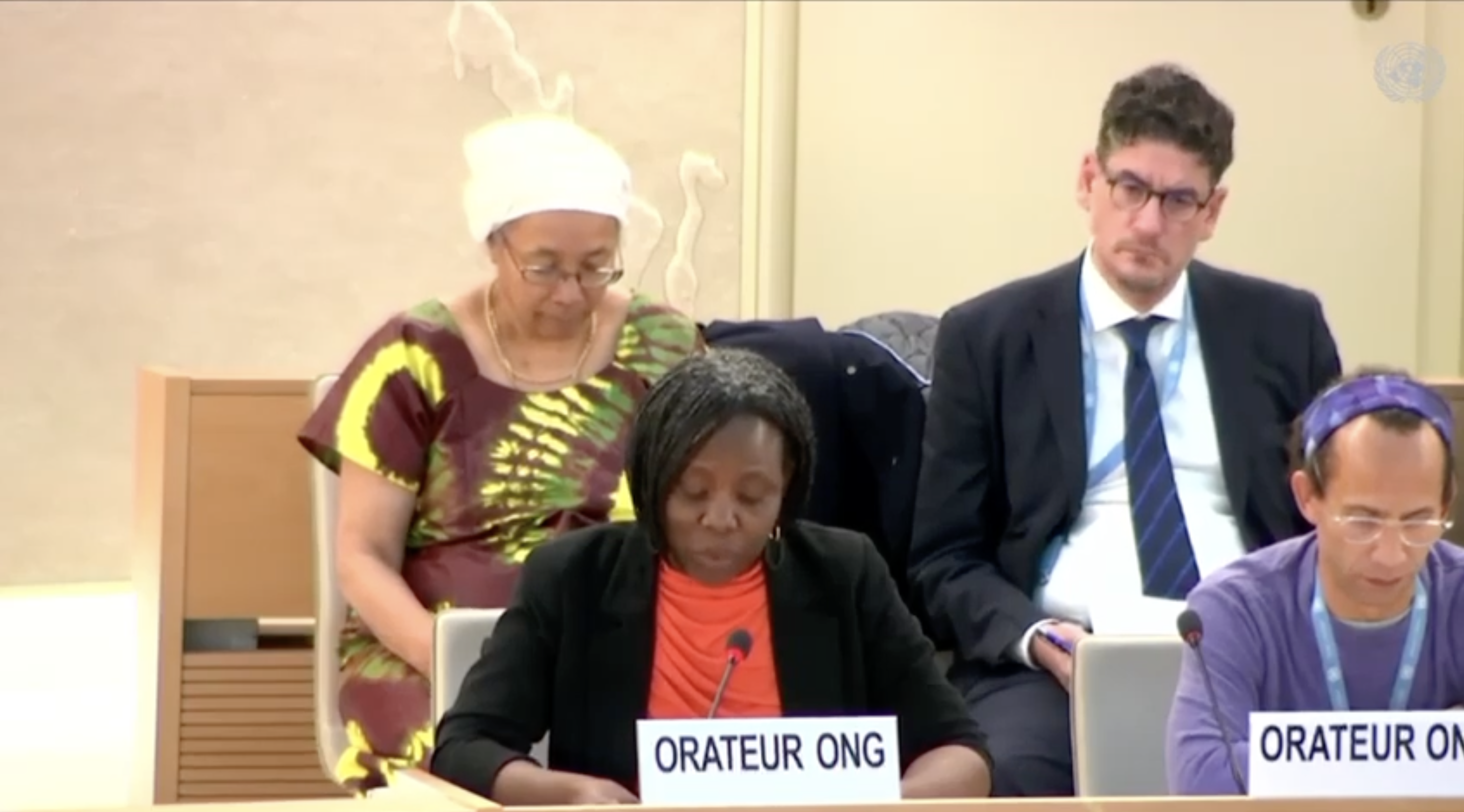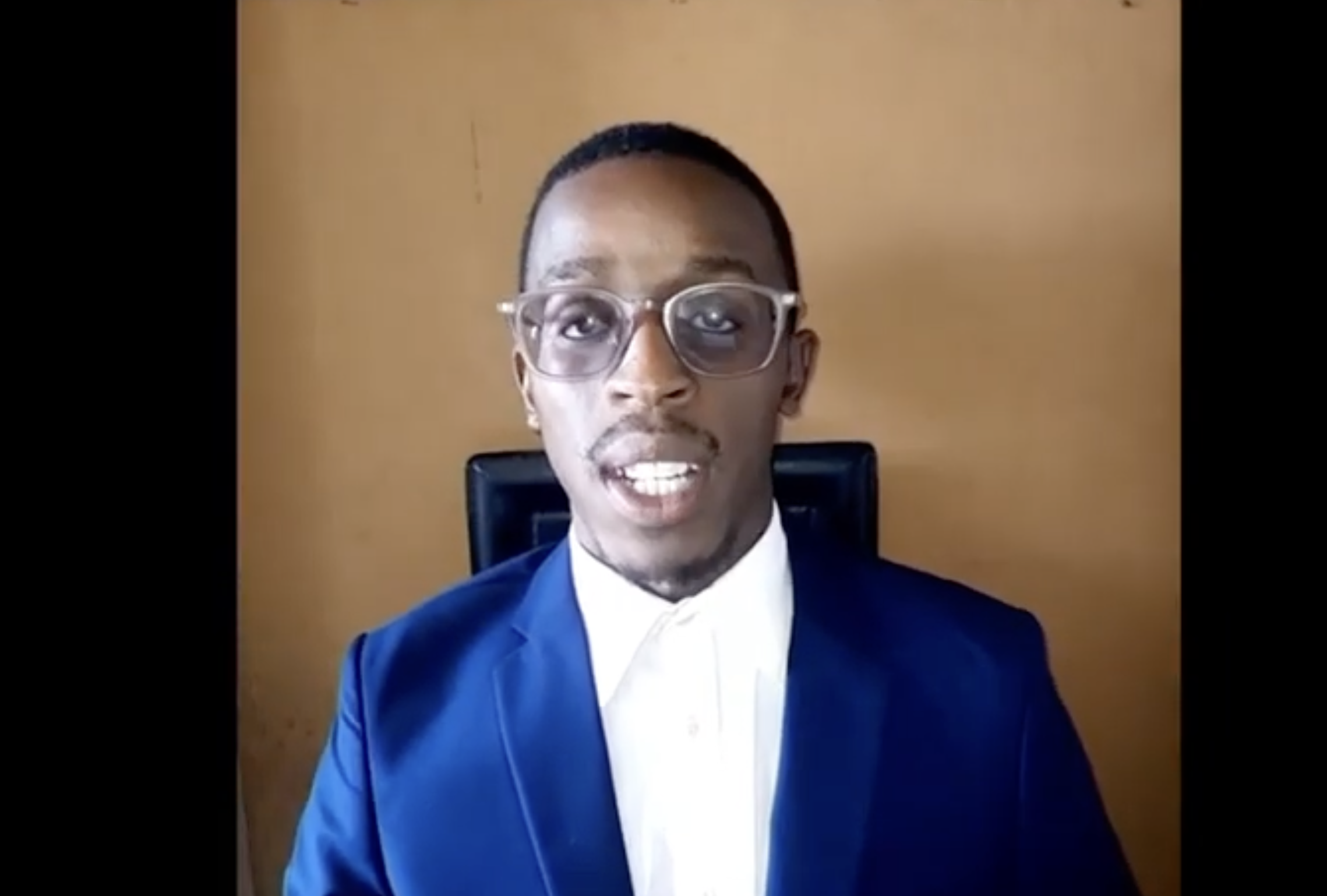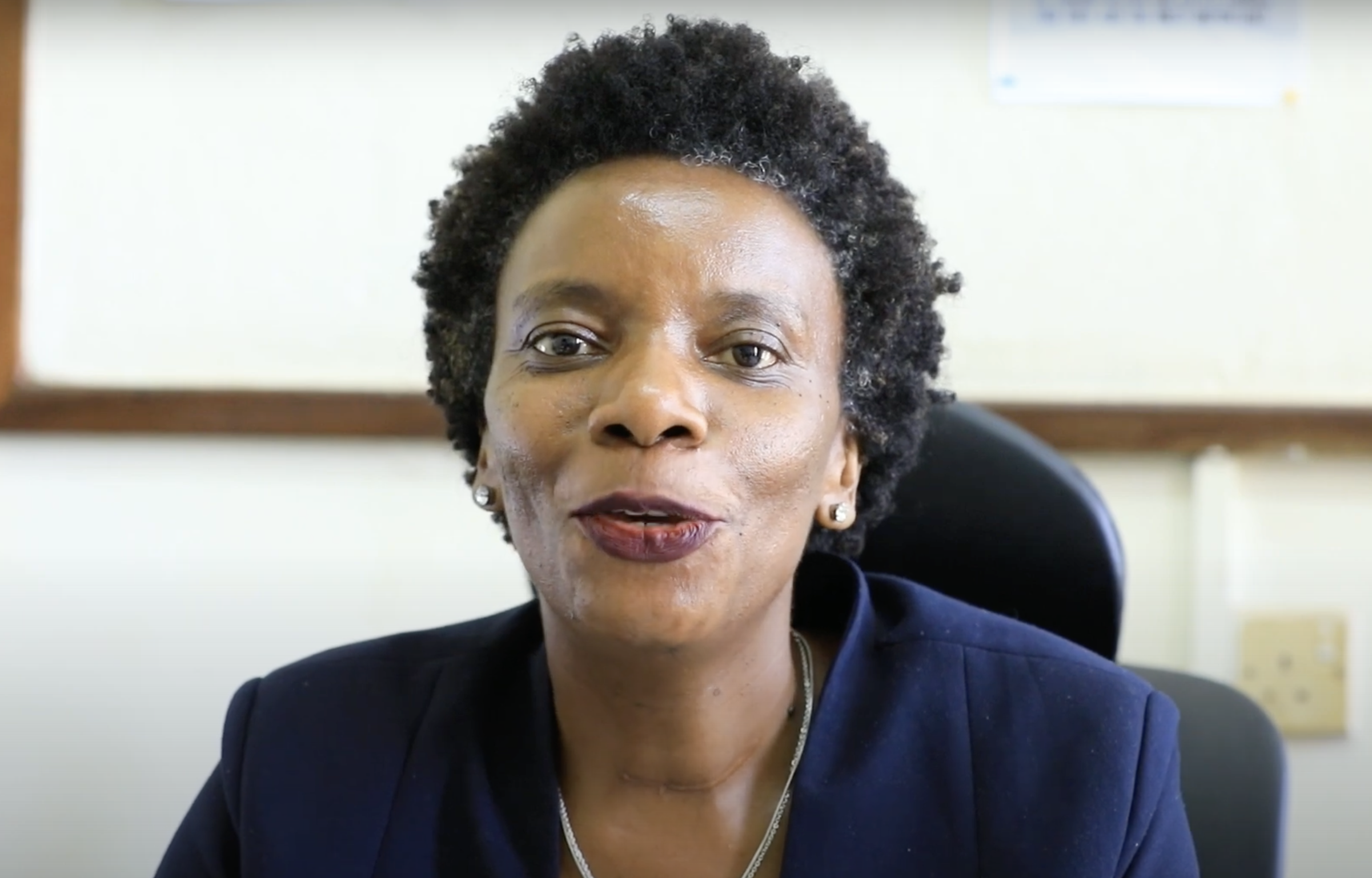The 50th Session of the Human Rights Council
13 June – 8 July 2022
Item 9: Racism, racial discrimination, xenophobia, and related forms of intolerance: follow up to and implementation of the Durban Declaration and Programme of Action.
5th July 2022
By Jamel Nampijja / GICJ
Executive Summary
The Special Rapporteur (SR) on racism, racial discrimination, xenophobia, and related forms of intolerance submitted on the 5th July 2022, two reports during the 50th regular session of the Human Rights Council. The first report explored sustainable development and its relation to racial justice and the international development framework under the 2030 Agenda. The second report explored the alarming growth of racist nationalist and far right political parties and organisations who typically use social platforms like Twitter and Facebook to spread racist ideologies and promote extremist political doctrines.
Additionally, the report analysed racism, racial discrimination, xenophobia, and related intolerance as they manifest through discrimination against persons and groups on the grounds of their race, colour, descent, and national, ethnic origin. The report highlighted two avenues of urgent intervention: critically acknowledging the role of the 2030 Agenda and maximising its emancipatory potential and utilising detailed approaches like the collection of disaggregated data to ensure monitoring and diagnosing of inequality that exists along racial ethnic and national lines.
Further, the report highlighted the effects of the COVID-19 pandemic, that demonstrated the persistence of racial and ethnic hierarchies in all aspects of life. Racially and ethnically marginalised groups were subjected to the worst effects of COVID-19, the wealthiest and the most powerful nations used a form health exclusion described by the SR as “vaccine apartheid”. Additionally, she identified that states also allowed exponential corporate profit while neglecting the means of the ethnically and racially marginalised in the face of soaring energy and food prices.
During the Interactive Dialogue, several delegates and representatives from Non-Governmental Organisations (NGOs) expressed concern over the increase in hate speech online and offline as well as the alarming global rise in racially and ethnically motivated violent extremism. The delegates called for increased efforts in addressing the root causes of racism and its intersections within gender, sexual orientation and gender identity, disability, ethnicity, religion, and national origin. They also highlighted the linkages between attaining sustainable development goals and eliminating racial inequality.
Various questions were raised about additional methods in which political hate speech and glorified Nazism can be combated to effectively eradicate systemic racism at its roots in order to address its dreadful consequences. Some delegates inquired about the most effective approach to countering prejudice and to challenging harmful norms or traditions that may have been passed on for generations.
The European Union, United States and Ukraine condemned Russia’s deceptive reasons for invading Ukraine such as fighting neo-Nazism, the group called on all UN member states to denounce Russia and its activities in Ukraine. They further called for the Council to suspend Russia. The delegate of France urged all states to ratify the International Convention on the Elimination of All Forms of Racial Discrimination.
In her concluding remarks, the SR expressed appreciation and support for racially and ethnically marginalised employees who are actively challenging systemic racism within international institutions, consequently providing fundamental leadership. Ms. Achiume stressed the need for institutional leaders to provide all necessary resources as well as political willpower to create spaces that are diverse and inclusive especially at decision-making levels. She urged States to make the utmost use of the human rights approach embedded in the 2030 Agenda to step up their actions to combat racism, racial discrimination.
Geneva International Centre for Justice (GICJ) commends the Special Rapporteur for her work and on an informative report, yet we are appalled by the upsurge of neo-Nazism, right-wing extremism and other hate groups on social media platforms spreading dangerous doctrines, hate speech, and propaganda.
GICJ urges States and social media platforms to implement policies and programmes that combat the increasing racial animosity in the media, including on the Internet as specified in the Durban Declaration and Programme of Action (DDPA). We also encourage States and education institutions to embody the DDPA’s call for the strengthening of human rights education.
GICJ appeals for international cooperation and solidarity in creating inclusive strategies and policies that support vaccine equity for poor nations that have been excluded from COVID-19 treatments.
Background
The scourge of racism is persistent, and it continues to take up new forms, affecting millions of people around the world through racial discrimination, xenophobia, and related forms of intolerance. Article 1(1) of the International Convention on the Elimination of All Forms of Racial Discrimination (ICERD) defines racial discrimination in broad terms as:
“Any distinction, exclusion, restriction or preference based on race, colour, descent, or national or ethnic origin which has the purpose or effect of nullifying or impairing the recognition, enjoyment or exercise, on an equal footing, of human rights and fundamental freedoms in the political, economic, social, cultural or any other field of public life” (UN Human Rights Office of the High Commissioner, 1996-2022).
The OHCHR devised the mandate of the SR on contemporary forms of racism, racial discrimination, xenophobia, and related intolerances under Resolution 1993/20 in 1993. It is one of 56 special procedures of the HRC aimed at strengthening international efforts in combating human rights violations.
The SR is an independent human rights expert appointed by the OHCHR to address all forms of racism, racial discrimination, xenophobia, and related intolerance on grounds of race, colour, descent, or national and ethnic origin. The mandate of the SR addresses gender, religion and all victims as mentioned in the Durban Declaration and Programme of Action including people of African descent, Arabs, Asians, indigenous people, migrants, and other minority groups.
The mandate requires the SR to submit annual reports to the HRC and the General Assembly, country visits, and transmit urgent appeals and communications to States regarding alleged human rights violations regarding contemporary forms of racism, discrimination based on race, xenophobia, and related intolerance.
The Council appointed Ms. E. Tendayi Achiume from Zambia as the 5th Special Rapporteur on 29th September 2017 and she commenced her duties on 1st November 2017. Ms. Achiume is currently a professor of law at the University of California, Los Angeles School of Law. She leads the International Human Rights Clinic, which provides voluntary legal counsel to individuals and institutions pursuing social justice within the international human rights framework.
Report of the Special Rapporteur
The first thematic report focussed on the urgent need for decolonising the global economic, legal and political systems, disrupting international hierarchies and moving beyond exclusive Eurocentric visions, models and means of economic development.
 Ms. Achiume stated that, notions of the economic, political, social, and cultural “backwardness” of former colonised peoples in supposed “developing” nations persists. The unequal access to COVID-19 vaccines, treatments, as well as intellectual property (IP) rights denied to developing countries to manufacture their own vaccines racialised the impact of the virus within and between states, demonstrating that the world has not done enough to dismantle systemic racism rooted in historical legacies of slavery, colonialism, and exploitation. The global development system led to economic inequality and the systemic violation of human rights particularly economic and social rights.
Ms. Achiume stated that, notions of the economic, political, social, and cultural “backwardness” of former colonised peoples in supposed “developing” nations persists. The unequal access to COVID-19 vaccines, treatments, as well as intellectual property (IP) rights denied to developing countries to manufacture their own vaccines racialised the impact of the virus within and between states, demonstrating that the world has not done enough to dismantle systemic racism rooted in historical legacies of slavery, colonialism, and exploitation. The global development system led to economic inequality and the systemic violation of human rights particularly economic and social rights.
She stated that the 2030 Agenda is inadequate in addressing systemic racism and xenophobia because of superficial commitments by States in addressing racial justice and equality despite acknowledgement by States and other stakeholders agreeing that racism, racial discrimination, xenophobia, and related intolerance are obstacles to achieving the Sustainable Development Goals (SDGs)
Ms. Achiume stressed that the hindrance in collecting disaggregated data because of limited resources, in addition to lack of political determination, limited progress towards racial justice in national and international contexts, thereby rendering the 2030 Agenda incapable of fundamentally disrupting the dynamics of racial discrimination and inequality. Moreover, research showed that the development framework is ill-equipped to disrupt racial inequality within and among states. Instead, the mainstream international development framework and financial systems remain mechanisms for racially discriminatory underdevelopment as they remain ill-suited to challenging the status quo, the Special Rapporteur stated.
The SR stated that States regularly request actionable recommendations to address racism but they do so even as they ignore and silence the communities that advocate in social movements that provide actionable and urgent answers to these very requests. Racial justice criticism and censuring of racial justice advocates remains a matter of concern, human rights defenders belonging to racially and ethnically marginalised groups are persistently in grave danger from state and non-state actors. She urged states to act and implement directives to end the backlash against racial justice and racial justice advocates.
The second report focussed on the alarming growth of racist nationalist and the fight against white supremacy, Islamophobia, or other forms of intolerance, Ms. Achiume stated that all approaches are hypocritical, entrenched with double standards that undermine the challenges. During country visits, she found that states are often too willing to have double standards and to take hypocritical and strategic approaches in condemning intolerance which makes it difficult then to fight back against existing intolerances.
Regarding combating the glorification of Nazism, Neo-Nazism, and related extremist ideologies under the General Assembly resolution 76/149, Ms. Achiume stated that though progress has been made, she continues to receive concerning civil society reports of startling racial justice backlash from violent neo-Nazis, far-right political actors, including some government actors who target racial justice campaigners and others.
Moreover, the SR called on states to stop exploiting the fight against neo-Nazism to justify territorial invasions as it leads to undermining genuine attempts to combat neo-Nazism and related manifestations of racist nationalist and militarist ideologies. She called on States and civil societies to uphold their commitment to safeguarding the human rights agenda, a framework which is fundamentally incompatible with political platforms that are founded on racial superiority nationalist populism and related intolerant ideologies.
Interactive Dialogue
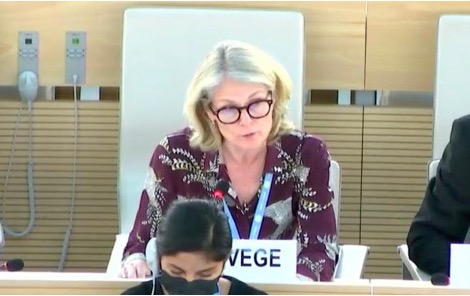 The delegate of Norway on behalf of the Nordic Baltic countries reaffirmed their commitment to combating racism racial discrimination xenophobia and related intolerance as stated in the Universal Declaration of Human Rights. The delegate emphasised the fundamental importance of development actors to prioritise the meaningful participation, representation and leadership of racially marginalised people including indigenous people in the creation of alternative approaches to development and human well-being.
The delegate of Norway on behalf of the Nordic Baltic countries reaffirmed their commitment to combating racism racial discrimination xenophobia and related intolerance as stated in the Universal Declaration of Human Rights. The delegate emphasised the fundamental importance of development actors to prioritise the meaningful participation, representation and leadership of racially marginalised people including indigenous people in the creation of alternative approaches to development and human well-being.
Since women and girls often face multiple and intersecting forms of discrimination based on their gender race and ethnicity, she expressed her dismay that the report didn’t include reference to gender issues linked to racism and discrimination in the context of the sustainable development goals.
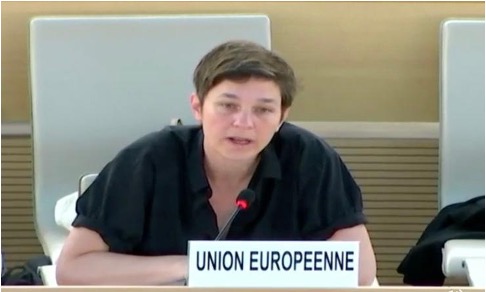 The representative of the European Union underlined the EU’s strong commitment to achieving sustainable and inclusive development and to promoting the full and equal enjoyment of all human rights by all individuals without discrimination on any ground. She highlighted the EU’s steadfast commitment to acknowledging, addressing, and discussing the legacy of past transgressions and the negative impact of the legacies of colonialism, which is important in combating racism and racial discrimination.
The representative of the European Union underlined the EU’s strong commitment to achieving sustainable and inclusive development and to promoting the full and equal enjoyment of all human rights by all individuals without discrimination on any ground. She highlighted the EU’s steadfast commitment to acknowledging, addressing, and discussing the legacy of past transgressions and the negative impact of the legacies of colonialism, which is important in combating racism and racial discrimination.
Regarding Russia’s military invasion and territorial aggression in Ukraine disguised as eliminating neo-Nazism, Ms. Steenbrugghe enquired about the most effective approach to debunking these kinds of claims.
 In their statement, the representative of Pakistan on behalf of the Organisation for Islamic Cooperation (OIC) expressed grave concern over the general systematic targeting of individuals and communities especially based on their religious beliefs. Mr. Hashmi explicitly condemned the practice of insulting holy books and religions especially Islam with instances like the publication of cartoons of Prophet Mohammed in France, the burning of the holy Quran in Sweden and hateful remarks by the spokesperson of India's ruling party. He called on the High Commissioner and special procedures to condemn these disconcerting cases and hold the perpetuators accountable for the increasingly violent actions of discrimination.
In their statement, the representative of Pakistan on behalf of the Organisation for Islamic Cooperation (OIC) expressed grave concern over the general systematic targeting of individuals and communities especially based on their religious beliefs. Mr. Hashmi explicitly condemned the practice of insulting holy books and religions especially Islam with instances like the publication of cartoons of Prophet Mohammed in France, the burning of the holy Quran in Sweden and hateful remarks by the spokesperson of India's ruling party. He called on the High Commissioner and special procedures to condemn these disconcerting cases and hold the perpetuators accountable for the increasingly violent actions of discrimination.
The representative of China expressed deep concerned over the grave violations of human rights of indigenous people specifically indigenous children by some specific countries in question who have had history committed genocide, and/or culturally eradicate indigenous people. The representative did not name the specific countries as he stressed that one specific country forcibly removed indigenous children from their family and their communities and sent them to so-called residential school where these children endured extensive abuses including hunger, corporal punishment, sexual violence, and a death toll that remains unspecified. He urged the countries responsible for these atrocities to conduct thorough investigation into their history of abuses against indigenous children. Moreover, the representative urged the Human Council to address the numerous violations against indigenous people by the countries in question.
The representative of Bangladesh called for action in respect of the sickening human rights violations in the Rohingya community in Myanmar who are experiencing State-sponsored racism and racial discrimination. Since these violations go against the values and principles of the DPPA, they hinder access to developmental opportunities and full enjoyment of human rights of the Rohingyas. The representative restated that the displaced Rohingyas should be able to go back to Myanmar and enjoy all human rights and have full and equal opportunities for their development in their society. She alsourged development actors to mobilise all necessary resources to minimise the incompatibility of racial justice, equality and non-discrimination with the current international economic structures in order to optimise the untapped potential of the 2030 Agenda for sustainable development.
The statement of the United Nations Children Fund (UNICEF) focused on the global economic structures and International Development frameworks that continue to perpetuate racial inequalities and fail to address concerns of racial justice and non-discrimination. The UNICEF representative urged States to take concrete steps in addressing racism, in the implementation of the 2030 Agenda including racial discrimination faced by children and allocating adequate resources. These are crucial to ensuringthat no-one is left behind as pledged in the 2030 Agenda. She reaffirmed UNICEF’s commitment to ensuring that no child is left behind and combating discrimination in all its forms. Furthermore, Ms. Murphy reiterated UNICEF’s recommendation of the SR’s plea to member states and all development actors to prioritise the meaningful participation, representation and leadership of racially marginalised peoples including children. This would help in the creation of alternative approaches to development and human wellbeing.
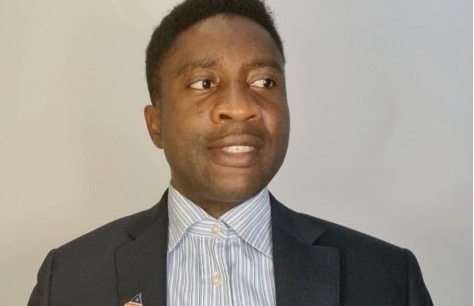 The representative of Namibia on behalf of the African group in his statement aligned with the SR saying that the current international development framework undermines global efforts to advance racial justice and equality.
The representative of Namibia on behalf of the African group in his statement aligned with the SR saying that the current international development framework undermines global efforts to advance racial justice and equality.
He emphasised that realising and fully implementing the right to development is one of the key solutions in addressing the issues raised in the report of the Special Rapporteur. He further stressed that the principles of non-discrimination, anti-racism and equality of development should be guided by the UN declaration on the right to development in the implementation of the development commitments under the 2030 Agenda.
The representative further called attention to the urgent need for States to do more in tackling racism and related discrimination regarding States’ management of international migration flows. Racism is a persistent evil that continues to create hostility at international borders which have become spaces of impunity as human rights violations against asylum seekers, refugees, and people of colour especially people of African descent. He called on the international community for collective responsibility and efforts to address these human rights violations including the discrimination against Africans at international borders.
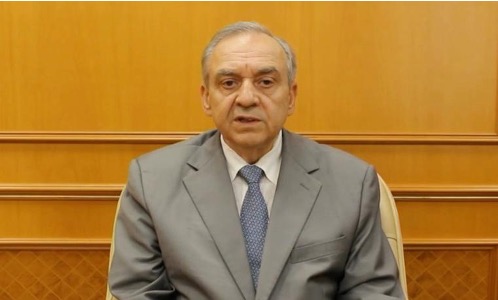 The representative of the Russian Federation condemned the increasing sentiments of Russophobia encouraged by several western countries. The representative urged the West and Ukraine to end the dangerous practice of Russophobia instantaneously. He stated that the West should accept the Russian Federation as a unique civilization including Crimea.
The representative of the Russian Federation condemned the increasing sentiments of Russophobia encouraged by several western countries. The representative urged the West and Ukraine to end the dangerous practice of Russophobia instantaneously. He stated that the West should accept the Russian Federation as a unique civilization including Crimea.
The representative of Ukraine interjected with a point of order to inform the council the representative of the Russian Federation is a representative of the administration occupying Crimea.
The representative for Ukraine urged all states, international organisations, and specialised agencies not to recognise any alteration to the status of Crimea following Russian occupation and the participation of Russian representatives in the proceedings.
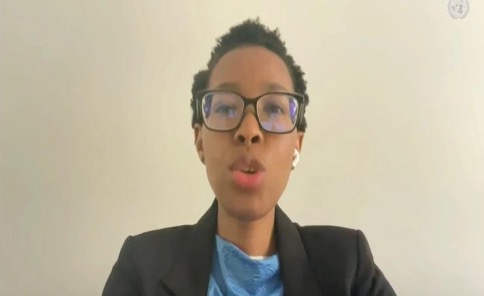 The representative of South Africa expressed concern with the disproportionate impact of COVID-19 within and among countries that reflected the colonial hierarchies created by failures to address the effects of racism rooted in slavery, colonialism, and apartheid. Ms. Mngomezulu described this phenomenon as “vaccine apartheid” that is a result of weak international cooperation and solidarity. The negotiations for the draft resolution on access to medicines before the Council demonstrated that the strategies utilised only advance corporate interests at the expense of justice and equality.
The representative of South Africa expressed concern with the disproportionate impact of COVID-19 within and among countries that reflected the colonial hierarchies created by failures to address the effects of racism rooted in slavery, colonialism, and apartheid. Ms. Mngomezulu described this phenomenon as “vaccine apartheid” that is a result of weak international cooperation and solidarity. The negotiations for the draft resolution on access to medicines before the Council demonstrated that the strategies utilised only advance corporate interests at the expense of justice and equality.
She further highlighted the monopolised authority that dictates the terms of who is worth or unworthy of saving which has tragically become evident in the vastly segregated treatment of Africans fleeing from Ukraine to other countries in Europe seeking refuge.
The European Union (EU) on behalf of the 27 member states including Australia, Canada, Iceland, Japan, New Zealand, Norway, Switzerland, United Kingdom of Great Britain and Northern Ireland and the United States of America condemned the ongoing aggression by the Russian Federation against Ukraine which violates the UN charter and fundamental principles of international law. She stated that the EU and its member states do not recognise the illegal annexation of Crimea and the city of Sevastopol by the Russian Federation. She urged the Russian Federation to abstain from letting any representative of its administration to intercede on its behalf within the HRC as well as in any other international forum.
The representative of the State of Palestine highlighted the West Bank fragmentation due to the settler expansion and the Gaza Strip blockade. She appealed to the international community to stand by their obligations under international law to put an end to Israel’s apartheid system and colonial occupation and mobilise their political will to end the cycle of impunity. The Israeli colonial military occupation continues to destroy all means of development in Palestine, in addition to ongoing land confiscation continuous exploitation of Palestinian financial and natural resources. The representative stated that the future of the Palestinians lies in emancipation from Israeli colonial occupation, sovereignty over their lands and controlling their capabilities and natural resources.
Several Non-Governmental Organisations’ representatives welcomed the SR’s reports and her analysis on the existing economic structures that continue to privilege the “developed nations” and disadvantage “developing nations”, marginalised groups among others. The NGO representatives acknowledged that while the UN, EU, and States are dedicated to implementing all necessary mechanisms to combating racism and related intolerances, the efforts utilised are insufficient. More so, the representatives highlighted the health inequities which were exposed by the global disparities in access to Covid-19 and other vaccines.
Concluding remarks
Ms. Achiume highlighted the significance and need for the collection of disaggregated data as stated by the Durban Declaration and Programme of Action to lay the foundations for a way forward to create the kind guidelines and develop a data framework to assess racial equality at national and international levels. Furthermore, she stressed the vital importance of understanding the World Trade Organisation and the International Monetary Fund as well as other actors who focus on economic and financial systems as avenues central to the fight against racial injustice and against systemic racism.
She stated that reparations are an integral part in combating systemic racism and further highlighted the significance of addressing historical legacies and publishing a report to the General Assembly as highlighted by the Durban Declaration and Programme of Action. Ms. Achiume commended the impressive research and innovation led by non-governmental organisations regarding the sustainable development solutions network which created numerous tools that are instrumental and practical to advancing the SDGs and can be implemented by UN member states.
After the concluding remarks of the SR, the Representative of the Russian Federation took to the floor to exercise her right of reply to respond to statements made by the delegations of Ukraine, the EU, and several other countries. She stated that the West has categorically discarded that the sociopolitical foundations of the regime they support in Kiev is neo-Nazi, consequently choosing a cynical tactic to turn a blind eye to Nazism in Ukraine where neo-Nazi formations are openly active.
Retaining the right to reply, the representative of Ukraine stressed that Russia’s propaganda regarding Nazism in Ukraine as validation for its invasion of the country has been disproven and condemned by the international community.
Position of Geneva International Centre for Justice
Geneva International Centre for Justice (GICJ) commends the Special Rapporteur for her work and on an informative report, yet we are appalled by the upsurge of neo-Nazism, right-wing extremism and other hate groups on social media platforms spreading dangerous doctrines, hate speech, and propaganda.
We urge States and media platforms to take the responsibility to provide and effectively implement a comprehensive legal framework that holds perpetrators criminally liable for their misconducts; States and social media platforms should adopt policies and programmes as stated in the Durban Declaration and Programme of Action (DDPA) to combat the incitement of racial animosity in the media, including on the Internet.
Online hate speech has led to the rise in global violence towards minorities. Racist groups are disseminating racist ideologies like the “replacement theory”, organising and publicising violent attacks on various social media platforms.
We encourage States and education institutions to embody the DDPA’s call for the strengthening of human rights education by providing fundamental support toward educational programs and subjects that challenge anti-democratic ideologies but enhance diversity, equity, and inclusion. The DDPA further emphasises the significance of preventive and concerted action, especially in the field of education and awareness-raising.
Therefore, GICJ stresses the urgent need for education institutions to be receptive to teaching critical race theory, a theory that aims at dismantling racial prejudices through acknowledging past and present injustices to improve racial justice and interactions for the future.
GICJ is calling for international cooperation and solidarity in creating inclusive strategies and policies that support vaccine equity for poor nations that have been excluded from COVID-19 treatments, without vaccine equity, the consequences of vaccine apartheid will be devastating far beyond the borders for conflict either regional or international will have an impact on each one of us directly or indirectly. Access to vaccines should be available to all irrespective of their location, race, colour, age, sex, or religious background.
Special Rapporteur, Racism, Racial discrimination, Xenophobia, Intolerance, Nazism, Neo-Nazism, Islamophobia, Anti-Semitisim, COVID-19, Vaccines, Apartheid, Interactive Dialogue, Human rights Council, HRC50, Regular Session, Human Rights, Geneva International Centre for Justice, GICJ, Geneva4Justice




